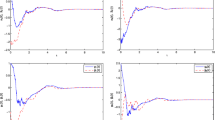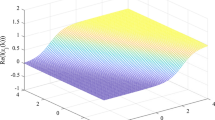Abstract
This paper addresses the problem of quantized sampled-data control for CVNNs with time-varying delay under the assumption that only quantized measurements are transmitted to the controller. Based on the discrete-time Lyapunov stability theory, reciprocally convex approach, a sector bound approach, and some estimation techniques, a reduced conservative stabilization criterion is obtained to guarantee the exponential stabilization of the considered CVNNs. The desired quantized sampled-data controller is designed via converting the complex-valued linear matrix inequality into real-valued ones. The effectiveness of the derived criteria are shown via an illustrative simulation example.




Similar content being viewed by others
References
Aizenberg I (2011) Complex-valued neural networks with multi-valued neurons. Springer, New York
Hirose A (2012) Complex-valued neural networks, 2nd edn. Springer, New York
Aizenberg I, Aizenberg N, Vandewalle J (2000) Multi-valued and universal binary neurons: theory, learning, applications. Springer, New York
Tripathi B, Kalra P (2011) On efficient learning machine with root-power mean neuron in complex domain. IEEE Trans Neural Netw 22(5):727–738
Chen S, Hanzo L, Tan S (2008) Symmetric complex-valued RBF receiver for multiple-antenna-aided wireless systems. IEEE Trans Neural Netw 19(9):1659–1665
Jankowski S, Lozowski A, Zurada J (1996) Complex-valued multistate neural associative memory. IEEE Trans Neural Netw 7(6):1491–1496
Savitha R, Suresh S, Sundararajan N (2009) A fully complex-valued radial basis function network and its learning algorithm. Int J Neural Syst 19(4):253–267
Fiori S (2008) Learning by criterion optimization on a unitary unimodular matrix group. Int J Neural Syst 18:87–103
Zhang Y, Huang H (2020) Adaptive complex-valued stepsize based fast learning of complex-valued neural networks. Neural Netw 124:233–242
Wu R, Huang H, Qian X, Huang T (2018) A L-BFGS based learning algorithm for complex-valued feedforward neural networks. Neural Process Lett 47(3):1271–1284
Liu Y, Huang H, Huang T, Qian X (2016) An improved maximum spread algorithm with application to complex-valued RBF neural networks. Neurocomputing 216:261–267
Yan Z, Huang X, Cao J (2020) Variable-sampling-period dependent global stabilization of delayed memristive neural networks via refined switching event-triggered control. Sci China Inf Sci 63:212201:1–212201:16
Wang Z, Li L, Li Y, Cheng Z (2018) Stability and Hopf bifurcation of a three-neuron network with multiple discrete and distributed delays. Neural Process Lett 48(3):1481–1502
Li YY, Lou JG, Wang Z, Alsaadi FE (2018) Synchronization of nonlinearly coupled dynamical networks under hybrid pinning impulsive controllers. J Frank Inst 355:6520–6530
Ji XR, Lu JQ, Lou JG, Qiu JL, Shi KB (2020) A unified criterion for global exponential stability of quaternion-valued neural networks with hybrid impulses. Int J Robust Nonlinear Control 30:8098–8116
Li L, Wang Z, Li Y, Shen H, Lu J (2018) Hopf bifurcation analysis of a complex-valued neural network model with discrete and distributed delays. Appl Math Comput 330:152–169
Wang X, Wang Z, Song Q, Shen H, Huang X (2020) A waiting-time-based event-triggered scheme for stabilization of complex-valued neural networks. Neural Netw 121:329–338
Duan L, Shi M, Wang Z, Huang L (2019) Global exponential synchronization of delayed complex-valued recurrent neural networks with discontinuous activations. Neural Process Lett 50:2183–2200
Hu J, Zeng C (2017) Adaptive exponential synchronization of complex-valued Cohen-Grossberg neural networks with known and unknown parameters. Neural Netw 86:90–101
Zhou C, Zhang W, Yang X, Xu C, Feng J (2017) Finite time synchronization of complex-valued neural networks with mixed delays and uncertain perturbations. Neural Process Lett 46:271–291
Liu Y, Qin Y, Huang J, Huang T, Yang X (2019) Finite-time synchronization of complex-valued neural networks with multiple time-varying delays and infinite distributed delays. Neural Process Lett 50:1773–1787
Zhao D, Wang Z, Ding D, Wei G (2020) \(H_\infty \) PID control with fading measurements: the output-feedback case. IEEE Trans Syst Man Cybern Syst 50(6):2170–2180
Gong W, Liang J, Kan X, Wang L, Dobaie A (2019) Robust state estimation for stochastic complex-valued neural networks with sampled-data. Neural Comput Appl 31:523–542
Zhang R, Zeng D, Park J, Liu Y, Zhong S (2018) Quantized sampled-data control for synchronization of inertial neural networks with heterogeneous time-varying delays. IEEE Trans Neural Netw Learn Syst 29(10):6385–6395
Yang X, Cao J, Xu C, Feng J (2018) Finite-time stabilization of switched dynamical networks with quantized couplings via quantized controller. Sci China Technol Sci 61(2):299–308
Yang X, Wan X, Cheng Z, Cao J, Liu Y, Rutkowski L (2020) Synchronization of switched discrete-time neural networks via quantized output control with actuator fault. IEEE Trans Neural Netw Learn Syst. https://doi.org/10.1109/TNNLS.2020.3017171
Xiong X, Yang X, Cao J, Tang R (2020) Finite-time control for a class of hybrid systems via quantized intermittent control. Sci China Inf Sci 63(9):192201
Wang Y, Shen H, Duan D (2017) On stabilization of quantized sampled-data neural-network-based control systems. IEEE Trans Cybern 47(10):3124–3135
Xi Z (2018) Dynamic sliding mode controller design for networked control systems with random packet loss and event driven quantisation. IET Control Theory Appl 12(17):2433–2440
Wakaiki M, Yamamoto Y (2017) Stabilization of switched systems with sampled and quantized output feedback. IET Control Theory Appl 11(12):1913–1921
Li P, Liu X, Zhao W, Zhong S (2020) A new looped-functional for stability analysis of the linear impulsive system. Commun Nonlinear Sci Numer Simul 83:105140
Zeng H, Teo K, He Y (2017) A new looped-functional for stability analysis of sampled-data systems. Automatica 82:328–331
Seuret A, Briat C (2015) Stability analysis of uncertain sampled-data systems with incremental delay using looped-functionals. Automatica 55:274–278
Lee S, Selvaraj R, Park M, Kwon O (2020) Improved results on \(H_\infty \) stability analysis of sampled-data systems via looped-functionals and zero equalities. Appl Math Comput 373:125003
Wu Z, Shi P, Su H, Chu J (2013) Sampled-data synchronization of chaotic Lur’e systems with time delays. IEEE Trans Neural Netw Learn Syst 24(3):410–421
Yao L, Wang Z, Huang X, Li Y, Shen H, Chen G (2020) Aperiodic sampled-data control for exponential stabilization of delayed neural networks: a refined two-sided looped-functional approach. IEEE Trans Circuits Syst II Express Briefs. https://doi.org/10.1109/TCSII.2020.2983803
Elia E, Mitter K (2001) Stabilization of linear systems with limited information. IEEE Trans Autom Control 46:1384–1400
Fu M, Xie L (2005) The sector bound approach to quantized feedback control. IEEE Trans Autom Control 50:1698–1712
Xu S, Chen T, Lam J (2003) Robust \(H_\infty \) filtering for uncertain Markovian jump systems with mode-dependent time delays. IEEE Trans Autom Control 48:900–907
Park P, Ko J, Jeong C (2011) Reciprocally convex approach to stability of systems with time-varying delays. Automatica 47(1):235–238
Fridman E, Shaked U (2006) Input–output approach to stability and \(L_2\)-gain analysis of systems with time-varying delays. Syst Control Lett 55(12):1041–1053
Acknowledgements
This work was supported by the National Science Foundation of China (Nos. 61973199, 61573008, 61773207) and the Shandong University of Science and Technology Research Fund (2018TDJH101).
Author information
Authors and Affiliations
Contributions
All authors read and approved the manuscript.
Corresponding author
Ethics declarations
Conflict of interest
The authors declare that they have no conflict of interest.
Additional information
Publisher's Note
Springer Nature remains neutral with regard to jurisdictional claims in published maps and institutional affiliations.
Appendix
Appendix
Proof
For any \(t\in [t_k,t_{k+1})\), according to Eq. (4), we have
Based on the Cauchy–Schwarz inequality, it follows from (24) that
For (25), we utilize the Cauchy–Schwarz inequality again and then we can get
According to Assumption 1, we have
Thus, we further obtain
By using the Gronwall–Bellman inequality, it follows from (26) that
Then, applying the Lemma 2 to (27), we can obtain Lemma 3 immediately. This completes the proof. \(\square \)
Rights and permissions
About this article
Cite this article
Wang, X., Wang, Z., Xia, J. et al. Quantized Sampled-Data Control for Exponential Stabilization of Delayed Complex-Valued Neural Networks. Neural Process Lett 53, 983–1000 (2021). https://doi.org/10.1007/s11063-020-10422-5
Accepted:
Published:
Issue Date:
DOI: https://doi.org/10.1007/s11063-020-10422-5




